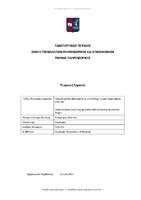Παιχνίδι ρόλων βασισμένο σε Unity3D με τυχαία παραγόμενα επίπεδα
Unity3D based role playing game with randomly generated stages

View/
Keywords
Unity3D ; Procedural generation ; RPG ; ΕπαναληψιμότηταAbstract
This thesis focuses on the development of a role-playing game (RPG) with dynamic level generation, using the Unity3D development engine and the C# programming language. The main goal was to implement an efficient Procedural Content Generation (PCG) system, aimed at providing a constantly changing, diverse, and unique experience for the user, thereby enhancing replayability. To achieve this, fundamental PCG techniques were applied, including seed-based randomization for reproducibility, grid-based room placement with provisions to prevent overlaps, and the A algorithm for connecting rooms. A incorporates advanced optimizations such as two-pass pathfinding and smart penalties, ensuring the creation of natural, functional corridors and full dungeon accessibility. The system is characterized by its robustness, incorporating fallback mechanisms for failed connections, and by its performance through optimized computations. Its architecture was designed with scalability in mind, allowing easy addition of new elements and mechanisms, including dynamic NavMesh generation for autonomous enemy movement. The results confirm the successful creation of dynamic and functional environments. The thesis highlights the contribution of PCG to enhancing the re-playability and interactivity of video games, as well as to more efficient cost and time management in development.

